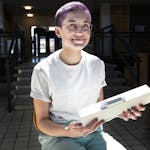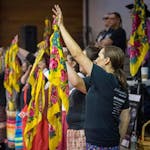Brianna Boone has long been drawn to work that improves the lives of people living on the margins. But Boone, a staff attorney at Southern Minnesota Regional Legal Services (SMRLS), never imagined where she'd set up shop. Since the fall of 2017, Boone has been the designated attorney at Children's Hospitals and Clinics of Minnesota, in St. Paul, where a promising health care-legal partnership is taking flight. Boone, a 2015 University of Minnesota Law School graduate, works out of a small office — a box of children's toys and books near her door. But most days, she's in patients' rooms, sometimes with an interpreter, helping worried parents navigate roadblocks that often have little to do with medicine.
Q: Your job is proof that health-harming factors often have nonmedical roots. Can you say more about that?
A: From October of 2017 through July of 2018, I had 138 cases inside the hospital. Fully 50 of these families' issues centered on housing. Lack of housing, or substandard housing, is a huge factor in determining good or poor health outcomes for families in our hospital. If your child uses medical equipment or needs medications, you need a place to store those things. You need a place to store food. Your family's health can be impacted by utility shut-offs, discrimination, eviction.
Q: This is, in essence, what legal aid attorneys do everyday. But you have this interesting focus.
A: I've been interested in the intersection of law and health care, but I never expected to be working in a pediatric setting. What's unique about what I do is that I can go into a patient's room to meet with the families. I collaborate with social workers, pediatricians, hospitalists. I help negotiate with landlords. It's a one-stop shop to get all their needs addressed. It's very helpful to be here in the hospital. I get 20 to 30 referrals a month and it's increasing. There's a lot of need.
Q: What's the likelihood that these families could navigate these challenges without your help?
A: Seventy percent of my clients are new to Legal Services. That shows our impact. That doesn't mean they've never needed legal help, but maybe they didn't feel comfortable asking for it. If the family of a child with a disability doesn't speak English, it would be very difficult for them to go through that process on their own. It makes it much less scary for them here.
Q: Please share a few success stories.
A: I worked with a family whose child had asthma. The family kept coming back to the hospital because the child's asthma was triggered by mold in their substandard home. They worked with me and we forced the landlord to mitigate the mold, which had a huge impact on the child's health. In another case, a child used a wheelchair and I helped the parents understand that they have the legal right to request "reasonable accommodations" for housing. We contacted their physician who submitted a reasonable accommodations request and a ramp was installed at their home.
Q: How are you supported financially?
A: Children's Minnesota funds me and another attorney at the Children's Minneapolis hospital campus through philanthropic support. It's great to have a health care partner so invested.
Q: How do parents and other caregivers respond when you enter their hospital room?
A: The families never question it. We've done a lot of educating about how what I do can improve the health of their children. We provide a range of services, such as advice about how to respond to an eviction notice, or what to do if they're behind in rent. We can also offer them full representation in court. They think it's great. One parent said it was almost a blessing in disguise to be in the hospital because, through this partnership and other services offered at Children's, they were able to get health insurance for their child, enroll him in school and talk to an attorney about their eviction record.
Q: I believe yours is among many such partnerships growing in hospitals, clinics and other places.
A: Onsite Healthcare Legal Partnerships (HLP) such as ours are widely recognized as effective tools to address health disparities. The first such partnership in Minnesota was at the Community-University Health Care Center in Minneapolis. They now number more than 400 nationally. This holistic approach to health care just makes sense.
Q: From where does your social justice drive derive?
A: Both of my parents grew up in poverty. They would often talk about their childhoods. But I had a pretty fortunate childhood. My sister and I were kind of spoiled. I was always interested in the history of injustices, including women's rights. Poverty is the root cause of a lot of injustices. I wanted to use my legal skills to help in any way I can.
Q: How does this good outreach benefit those beyond your scope?
A: Alleviating poverty and allowing children to live in a stable home and go to school is always a net benefit for everyone. Studies show that families who receive HLP intervention are more likely to have up-to-date immunizations, participate in routine clinic visits and are less likely to use the emergency room. But it's more than that. Those formerly dealing with a crisis can now interact in their community and bring diverse ideas to the table.






